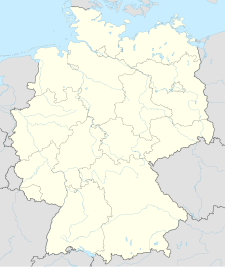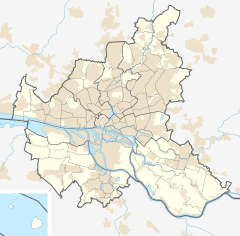Neuengamme concentration camp
| Neuengamme | |
|---|---|
| Concentration camp | |

Neuengamme concentration camp perimeter along the Dove Elbe embankment
|
|
| Coordinates | 53°25′50″N 10°14′1″E / 53.43056°N 10.23361°ECoordinates: 53°25′50″N 10°14′1″E / 53.43056°N 10.23361°E |
| Location | Hamburg, Northern Germany |
| Operated by | Schutzstaffel (SS) |
| Commandant |
|
| Operational | 1938–1945 |
| Killed | 42,900 |
| Liberated by | British Army |
| Website | Official website of the memorial Neuengamme |
The Neuengamme concentration camp, was a German concentration camp, established in 1938 by the SS near the village of Neuengamme in the Bergedorf district of Hamburg, Germany. It was operated by the SS from 1938 to 1945. Over that period an estimated 106,000 prisoners were held at Neuengamme and at its subcamps. 14,000 perished in the main camp, 12,800 in the subcamps and 16,100 during the last weeks of the war on evacuation marches or due to bombing. The verified death toll is 42,900. After Germany's defeat in 1945, the British Army used the site until 1948 as an internment camp. In 1948, the facility was transferred to the Hamburg prison authority which tore down the camp huts and built a new prison cell block. After being operated as two prisons by the Hamburg authorities from 1950 to 2004, and a period of uncertainty, the site now serves as a memorial. It is situated 15 km southeast of the centre of Hamburg.
In September 1938 the SS-owned company DEST Earth & Stone Works bought the defunct brickyard (German: Klinkerwerk) in Neuengamme. On 13 December 1938 the Neuengamme concentration camp was set up, with the first 100 prisoners coming from the Sachsenhausen concentration camp.
In April 1940 the SS and the city of Hamburg signed a contract for the construction of a larger brick factory, and on 4 June the Neuengamme concentration camp became an independent main camp. .
According to the testimony of Wilhelm Bahr, an ex-medical orderly, during the trial against Bruno Tesch, 200 Russian prisoners of war were gassed by prussic acid in 1942. In April 1942, a crematorium was constructed at the camp. Prior to that all bodies were taken to Hamburg for cremation. In late 1943, most likely November, Neuengamme recorded its first female prisoners according to camp records. In the summer of 1944, Neuengamme received many women prisoners from Auschwitz, as well other camps in the East. All of the women were eventually shipped out to one of its twenty-four female subcamps.
...
Wikipedia



